Since Snapchat launched in 2011, brands have been experimenting with new ways to reach the platform's Gen-Z and millennial audiences.
However, marketing on Snapchat hasn't always been easy.
Between 2015 and 2017, brands like NASA, Warby Parker, and Sour Patch Kids started their Snapchat strategies by creating individual accounts. Based on the fact that none of these accounts are still posting, it seems that they quickly found that Snapchat's platform did not do them any favors.
For example, since branded individual accounts are essentially the same as personal accounts, there's essentially no difference between businesses and people on the platform. When following a business on Snapchat, it's hard to tell if you're following the actual company or just another account posing as such.
Aside from the account confusion, Snapchat's platform also makes it difficult for users to search, find, or discover new brands. For example, users still need to search for a brand's exact username or scan a Snapcode to find the company. This means that brands that market themselves on Snapchat accounts would need to do promotion on social media or other areas outside of the Snapchat platform to let people know that they're actively posting there.
While many brands experimented with Snapchat Stories on their accounts, they still couldn't link to their own websites or products. This might have also caused some friction as brands might've determined that they didn't want to create content that wasn't going to result in web traffic or an immediate ROI.
Because of these friction points, many brands have pivoted to other platforms, like Instagram Stories. Many marketers have also said that Instagram content receives much more engagement than Snapchat content.
Today, if you search brand names on Snapchat, you might find inactive old accounts. When you add one of these accounts as a friend, you'll most likely see that they don't publish anything there anymore. Many of them also don't even have an emoji image or profile picture associated with their accounts anymore.
Here's an example. A few years ago, I followed Warby Parker via a Snapcode they shared on social. Not only is the brand's image gone, but it also hasn't posted a story or any content from this account in a while:
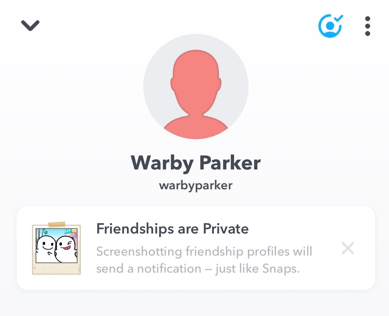
With the failure of branded individual accounts, things improved for big brands with the 2015 launch of Snapchat Discover.
What Is Snapchat Discover?
If you're less familiar with Snapchat, Discover is a page of the app that shows Story-styled content from publishers, brands, and major influencers who partner with the tech company. Below is a screenshot of what Discover looks like today. You can read more about this feature here.
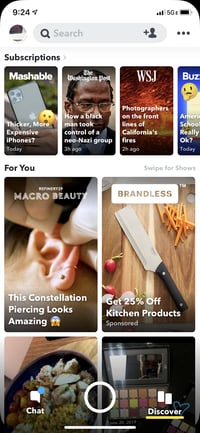
In the early years of Discover, the format looked very different from the screenshot above. In fact, there were only a few Snapchat publishing partners that could have Stories on this section of the app. These partners were often publications, lifestyle magazines, or news organizations.
Here's an old video demo for Snapchat Discover which shows how simple the section was and how it only had 12 major publishing partners on its home screen:
By 2018, Discover changed its formatting drastically to become more brand-oriented. The company also got less picky about its partnerships. While it still partners with big brands and major influencers, the company reportedly has over 52 publishing partners.
Still, since Snapchat makes the final call on who gets to publish in Discover, this section of the app might still be inaccessible to you or other small-business marketers at the moment.
Because Snapchat also doesn't allow links or certain promotional language in partner Stories, attempting to become a publishing partner probably wouldn't benefit you if your company relies on ROI and conversion to grow.
If you aren't a Snapchat partner, but have an advertising budget, landing a promoted Story on the Discover feed could become slightly more accessible in the future. Currently, Snapchat allows you to advertise by publishing promoted Stories in the Discover feed. You can also run in-stream ads that feature short videos within longer Stories created by Discover publishers.
Recently, the app company also announced that it would be offering more in-stream ad placement opportunities to businesses through its new Snapchat Select advertising tool.
Alternatives to Snapchat Discover
While Snapchat Discover is a great option for bigger or older brands that want to spread awareness to new or younger audiences, you still might want to look at alternative platforms if you decide that a social media Story strategy is right for you.
For example, many small, mid-sized, and even larger brands now turn to Instagram or Facebook Stories. While you can create Stories with music, videos, and special effects on these platforms, you can also link your Story content to your website and add interactive features like polls. Because both Facebook and Instagram are both hugely popular and free to use, it seems like these platforms might be the best place to start you're looking for a scalable and affordable Story strategy.
How Small-Business Marketers Should Use Snapchat Discover
Before you run off to Instagram or Facebook, you shouldn't completely disregard Snapchat just yet. In fact, Snapchat might be one of your most useful tools when brainstorming how you will manage your Story strategy, even on another platform.
You can easily surf Discover content to see what the big brands are doing, which types of Stories could be most scalable for you on another platform, and to get an idea for what's engaging to younger audiences that enjoy watching Stories throughout social platforms.
To keep you in the know of current Snapchat strategies and give you inspiration for your own Story content, here's a look at 13 brands that are leveraging Snapchat Discover for Story-based promotion and paid advertisements.
Examples of Snapchat Discover Stories Published by Brands
More often than not, Snapchat Discover partners are publishing companies or entertainment organizations, This is because these types of brands are already creating content that first with Snapchat's visual-storytelling oriented platform. These companies are already known for telling great stories and have the resources to adapt their content into bite-sized mobile-friendly Stories.
Here are a few examples:
1. Wall Street Journal
Although the Wall Street Journal can't link Discover Stories to its website, the publication still adapts its daily news content to the Snapchat platform. For example, WSJ will regularly post visuals and highlights from some of its long-form or investigative content that was also recently published online or in its newspaper.
While some publishers might try to post lighter Stories that are more targeted towards younger people on the Snapchat platform, WSJ stays very on-brand by publishing content related to finance, culture, and its own investigations. By posting daily Editions -- or Stories that hold multiple smaller Stories -- WSJ embraces a traditional magazine or newspaper format, even on the Discover platform.
Aside from breaking down a larger news report into short-form Story pages, called snaps, WSJ uses Snapchat's swipe up feature to enable viewers to swipe their finger up to access a longer-form story that's placed in Snapchat's CMS rather than WSJ's website. While WSJ features a few Stories in each daily edition that require a swipe up for more content, they usually post one to two news pieces that are just presented in snaps.
Here's an example of a WSJ edition with multiple Stories related to news highlights.
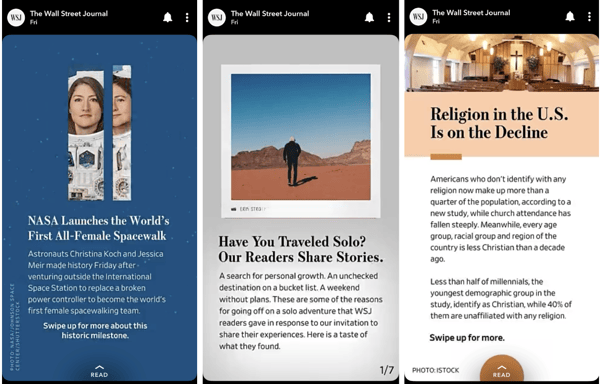
Although WSJ has been going against the grain by posting Stories on dryer topics, they have still intrigued audiences on the platform and had a good standing with Snapchat Discover for many years. This is a great example of how a company stayed true to its brand, even on a new platform, and was rewarded for it by getting new audiences and boosting brand awareness.
If you're a marketer for a publication or even a brand that simply has a blog. You could explore the idea of adapting your company's blog posts, articles, whitepapers, or research reports to an Instagram or Facebook Stories format. After adapting this content, you could also link it to your website via Facebook or Instagram's swipe up feature, or provide a call to action at the end of your Story that tells prospects to visit your site.
Adapting your content or expert tips into Stories will allow you to demonstrate your brand's expertise in its industry. Then, as people are looking for a product in your field, they might look at your Stories or remember your company as they're researching products and brands online.
2. Harvard Business Review
When you hear the word "Harvard," you might think of geniuses, scientists, and Ph.D.s that write and speak so complexly that you won't understand them. However, when Harvard Business Review began publishing on Discover, the publication began to break this mold by telling easy to understand Stories about complex topics like technology, job seeking, academics, finances, and even global warming.
Like WSJ, Harvard Business Review also adapts its web content to the Discover platform. However, Harvard Business Review publishes a mix of harder content and advise oriented content, rather than just investigative news.
While WSJ sticks to posting snaps or long-form Stories, HBR editions usually include a mix of snap-based Stories, a few swipe-up Stories, and even interactive elements like poll or quiz content. They have also experimented with video and animation to make Stories more eye-catching.
Here's an example of an HBR story that was adapted from a longer piece of thought leadership on hbr.org:
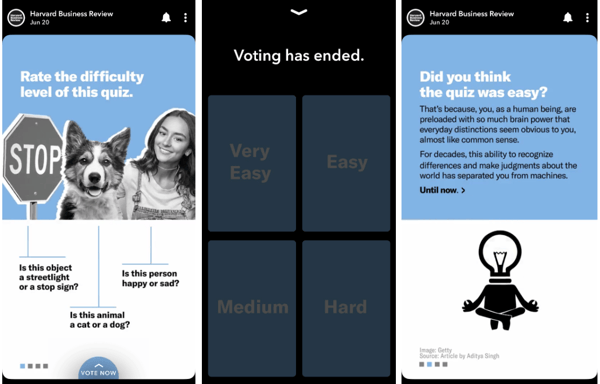
Because Harvard is seen as so credible, young people might be too intimidated to read its content online or in its magazines. However, a Discover Channel like this allows them to argue that misconception as they adapt and present their content to a younger audience which might find various HBR tips valuable, relatable, and understandable.
While younger generations may not have known about HBR, they might view its Stories on Snapchat and understand HBR's mission and how a business publication can still be valuable to them.
Harvard Business Review also recognizes the benefits of Instagram Stories. On this platform, they publish some similar or identical Stories but include swipe ups to the actual web articles that each piece of content relates to. This goes to show that what brands do on Snapchat can also be scaled and adapted to fit the Instagram Story setting and audience.
You could use Stories similarly to give people in your industry understandable and valuable tips and guidance. As we've seen with both HBR and WSJ, Stories could also be a great tool to use if you want to tap into younger audiences. With Facebook and Instagram Stories, you can also add interactive elements, like HBR does in its Snapchat Stories. These elements will engage users and potentially make them think more deeply about the discussed topic.
3. National Geographic
National Geographic posts content that's fairly similar to what you'd see in its magazines or on its television channel. However, the brand makes slight visual tweaks and often adds interactivity to Stories to make its content engaging on the Snapchat platform.
One common strategy National Geographic uses is telling viewers Stories filled with quick fun-facts about animals. For example, the Story below explains the history of the goldfish:
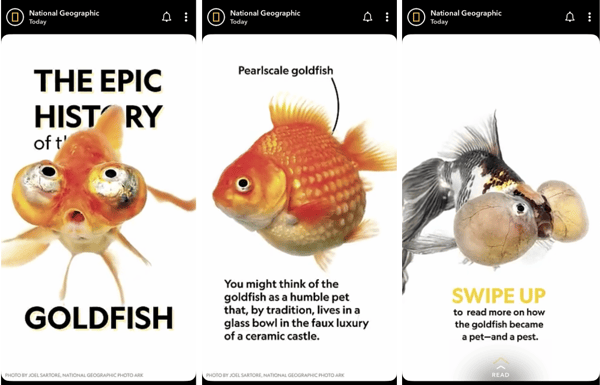
Because platforms like Snapchat are so fast-paced, Stories that read more like fun-facts or news bites -- like the goldfish example above -- might avoid dropoff and be more engaging to users who want to be entertained or informed quickly.
With this channel, National Geographic gives Snapchat users a look at its brand. Those who are interested in National Geographic's Stories, information or beautiful imagery might begin to follow the brand's other social channels, watch its television shows, or even subscribe to its publications.
While marine sciences might be interesting in a long National Geographic documentary, publishing that type of detailed content on Discover might get too complicated for the story platform, the brand decided to simplify its content, zone in on a well-recognized goldfish, and educate viewers about unique fun facts they might not have known.
If your brand works within a complex or broad industry that might intimidate people on social media. Consider posting Stories that simplify certain topics. To do this, incorporate history, word definitions, and other fun facts related to your product or service to make the content feel more educational rather than promotional.
4. Mashable
Like the publications listed above, Mashable also adapts its online content to Snapchat. In the example below, Mashable discusses the new Google Pixel alternative to AirPods.
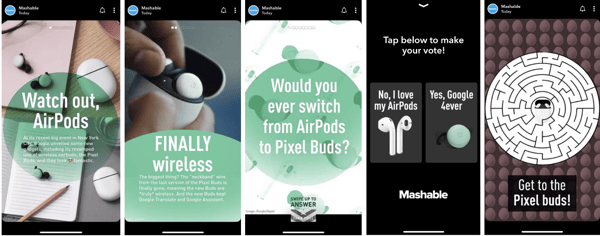
Mashable, a tech publication, does a good job of recognizing that young, tech-savvy users might be prevalent on Snapchat Discover. The publication also understands that these users like to be engaged in different ways such as interactive quizzes, polls, or even a maze-like snap seen at the end of the above example.
Like Mashable and some of the other Story examples above, you might also want to take advantage of your chosen Story platform's interactive options. In the above example, Mashable includes a poll related to the topic it's discussing and then encourages users to screenshot and draw on the AirPod-themed maze on the last snap. This way, those who aren't as interested in earbuds can weigh in with a poll, or try to solve a fun maze puzzle. This makes the Story engaging for multiple people who aren't just tech buffs.
If you work in a field that sees a lot of news, unveilings, or product launches, it could be beneficial to create Stories that discuss the ins and outs of your industry and how some products might be better than others. This type of content might make your brand look like a credible expert in your field and could lead viewers to trust that you also sell quality products.
Furthermore, adding interactives like Mashable will make your Stories more engaging, memorable, and fun for a variety of audiences, even if they aren't exactly within your field.
5. The Food Network
The Food Network's Snapchat Discover strategy is very similar to its Instagram Story strategy. In both Story formats, Food Network gives recipes, food-related tips, or discusses food-related trends, such as celebrity diets.
The Food Network does a great job of leveraging the visual aspects of its brand by showing off recipes and other kitchen-related content. The brand also uses Snapchat for more odd-ball Stories that include fun-facts or light life hacks that someone can remember after quickly tapping through Discover content.
In the example below, the Food Network begins its Story by telling viewers how to grate and prepare cheese. The Story concludes with a shareable snap that says "You're Grate." This enables viewers who like the corny pun to send this snap of the Story to a friend that they think is great.
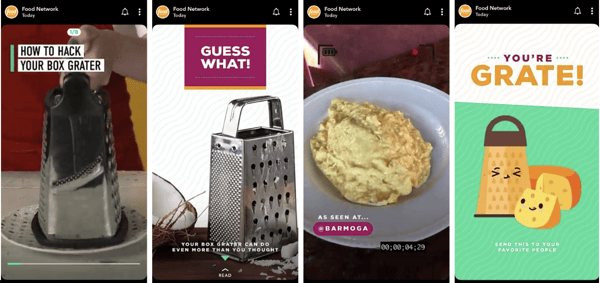
While the Stories don't link to the Food Network's website or television content, this type of content is still interesting or entertaining to watch, gives useful compact tips to viewers, and ends on a high note with a fun interactive image. This overall strategy allows users who were unaware of the Food Network to find the channel, get a sneak peek of what they might see on its actual TV channel, and then share a piece of the Story they saw with someone else.
6. UCLA Gymnastics
While a big majority of Snapchat Discover channels are run by publications or content creators, one great exception is the UCLA Gymnastics channel. UCLA Gymnastics' Stories often give a behind-the-scenes look at the gymnastics teams, practices, or tournaments.
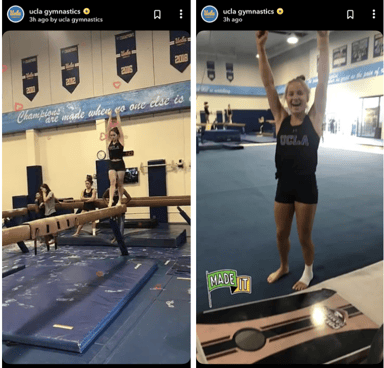
While many of the Stories on Discover often cater to news, beauty, tips, or lifestyle content, UCLA Gymnastics' channel might be interesting to sports or gymnastics fans who want to learn more about a nationally ranked college team. Since members of the team are also college-aged, like many on the Snapchat platform, viewers might find these Stories easier to relate to than Stories of older athletes.
With the gymnastics team's Discover channel, UCLA might have identified that young adult audiences were more prevalent on the Snapchat platform and decided to spread awareness about the team via Stories. This is a great example of identifying where your most interested fanbase might be and meeting them where they are.
If you're looking to test out Story content on various platforms, consider taking a similar note from UCLA gymnastics by offering viewers an inside look at your business or organization. For example, you could show your team at events or in the office designing new products. Or, you could do interviews with your staff where they can give their expert opinion on topics related to your industry. This allows viewers to see the more human side of your company rather than just a business that might solely want customers to buy their products.
Examples of Shoutouts in Snapchat Discover Stories
Because Snapchat Discover is a more applicable platform to publications that are already creating content, some brands might choose to work with publishers to promote their product. With this strategy, the publisher creates Story content that highlights the brand they're working with. Here are a few solid examples of this type of Discover Story:
7. Sperrys and Style Insider
Recently, Style Insider was invited to a Sperrys factory to cover the production process of the iconic shoe. Style Insider then filmed a vertical Story that showed every aspect of the design process, including the painting and lacing of the shoes.
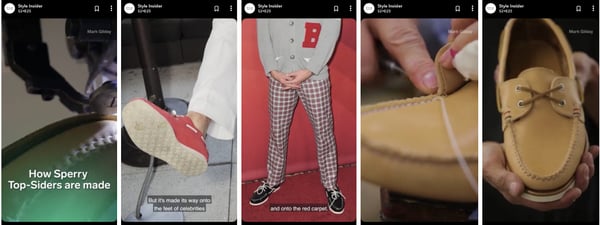
While this is visually fascinating to look at and interesting to Style Insider's fashion-savvy audience, the Story also allows Sperrys to demonstrate the intricate details and work that goes into every single shoe.
Viewers might watch this and believe the shoe is made with care and of good quality. Because Style Insider also begins the Story by highlighting the history of the shoe's popularity, viewers might also be persuaded to buy the shoe so they can appear more fashionable or trendy.
8. Rivian and Car Insider
Car Insider regularly posts Stories about major car brands, such as BMW. However, in a recent profile-styled Story, they discussed Rivian, an autonomous electric vehicle startup that was attempting to compete with Tesla.
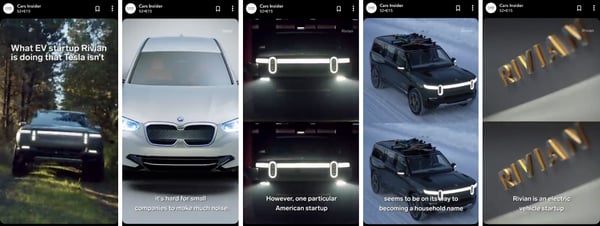
The Story highlights some of Rivian's newest car models, how they are more affordable, and aspects of the company that make it different from Tesla. It also gives quotes and soundbites from Rivian employees.
While Discover might be too expensive or time-consuming for a startup, this is an example of how companies can still reach out to press or content creators for solid coverage.
Because Car Insider has gained clout in the automotive industry, Snapchatters interested in cars might follow its Discover channel and use it to get quick expert-created Stories about new launches or automotive technology. When these car fans hear about Rivian or other companies from an automotive expert or publication, they might be more likely to remember how highly regarded the company was when they're shopping for a new car.
If you want to leverage Stories on some type of platform, but don't have the resources or time to make your own, consider reaching out to publishers or content creators who publish Stories related to your industry. By doing this, you could get your product covered in their content or sponsor content that talks directly about your brand.
9. Color Coat Beauty Boutique on Macro Beauty
While some brands will work with Snapchat Discover publishers to get good coverage in their Stories, some brands can also volunteer their tips or experts to publishers. For example, in a recent Story from Macro Beauty, a fashion and lifestyle-related Discover channel, a rep from a Los Angeles Salon called Color Coat Beauty Boutique gave manicure tips and walked through the process of placing nail extensions.
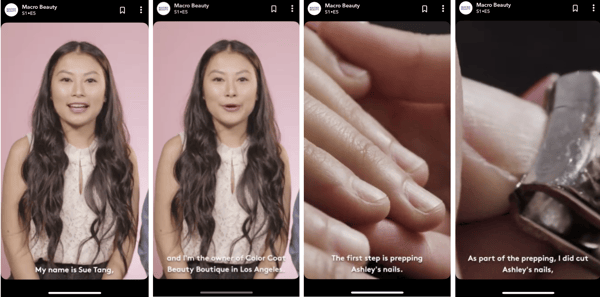
Although this expert is telling viewers how they can get salon-quality nails from home, she's also demonstrating her expertise in nail art. Viewers in the Los Angeles area who see this might trust that this rep is an expert at nail art. Then, if they need a nice manicure, they might be interested in investing in one from her salon.
If you're unable to make your own Stories Snapchat, Facebook or Instagram, but have an expert affiliated with your company that doesn't mind giving tips on camera, you could allow other brands to interview or show tips from this person in their Stories. When someone from another content creator's audience sees there Story and learns about your brand's expert, they might want to learn more about your company or buy products from you.
Snapchat Discover Ads
Snapchat Discover ads have evolved from short video ads that last for a single snap to mini-promoted Stories that actually show up on the Discover feed. Here are a few examples of how brands leveraged Story-styled ads on this platform.
10. Purple Mattress
Purple is currently running a simple promoted Snapchat Story on Discover. It only includes two snaps that explain what the Purple Mattress is made of. While this content is very short compared to other promoted Stories, Purple gets to the point quickly by explaining the unique aspects of its mattresses in a short amount of time.
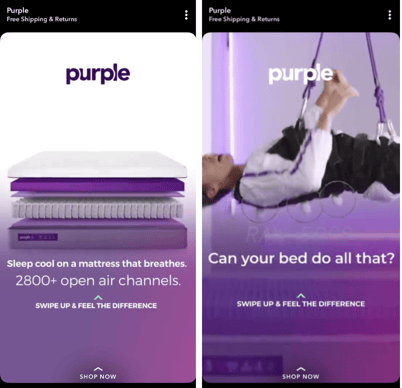
This quick Story might be a smart move because mobile applications like Snapchat are much more fast-paced and might see high Story dropoff rates from viewers. With any mobile Story platform, it's key to get the important information out or hook the viewer within your first few snaps so they don't tune out before seeing the meat of your content.
Another thing Purple does well is identifying where its audience is and meeting them there. While some of Snapchat's Gen-Z viewers might not be able to purchase a mattress yet, some of the platform's older audiences might be looking to purchase an affordable bed from a trendy or disruptive company like Purple.
11. Bumble
In a promoted Story, Bumble presented photos taken on vacation by couples who first met on the dating app. While vacation photos and romantic Stories might be enticing to Snapchat's young adult audiences, Bumble also argues that it has successfully matched a number of successful couples and that it can also match the viewer.
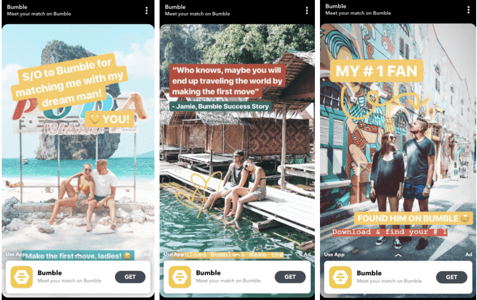
While this feels a bit like a native ad, Bumble still aims to tell the story of some of its most successful couples. This type of content might both entertain a viewer and pique their interest in the app if they are single.
If you're a company that similarly has a lot of success stories, consider using a Story on one of the various platforms to show customer testimonials or photos or videos of people benefiting from your product. This could both entertain your audience and make them trust you as they see real-world examples of your product's success.
12. Raymour & Flanigan
Raymour & Flanigan, a furniture company, also recently used a promoted Story to highlight its products. However, rather than trying to show off a narrative, the company's snaps feel more like a multi-page ad. Rather than telling a story, each snap shows a room in someone's home that's filled with furniture from the brand. Then, text on each page lists "It's time to make time for…" followed by a word related to the room shown on each page.
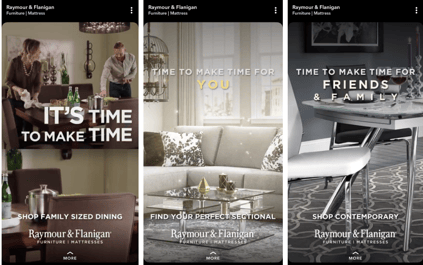
This ad isn't meant to be an intriguing story, but it does provide interesting visuals and a message that might get a viewer to slow down and think about what they might need to make more time in their lives for.
If you haven't really experimented with Story platforms before, but do have video or image-based advertising assets, you could try out a similar strategy of making an ad with a vertical Story format. As you do this, it could also be helpful to follow Raymour & Flanigan's lead of showing your products in a real-world setting. This strategy can be more beneficial than a Story that just shows product shots because viewers will be able to visualize how your products will look in their own homes.
13. Ritual Vitamins
In its promoted Snapchat Discover Stories, Ritual Vitamins customers getting the brand's sparkling vitamins and beginning to take them. The Stories then show the customers talking about how they've enjoyed the vitamins months after beginning the regimen. The customers also mention why they like taking Ritual Vitamins over other competing products.
For example, in the Story shown below, a customer says that Ritual Vitamins don't give her a stomach ache as other vitamins do:
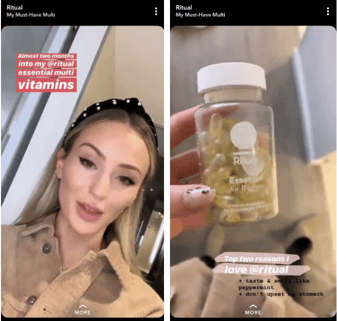
Unlike Purple and other promoted Snapchat Stories, this promotion walks prospects through a customer's experience with using a product. While Ritual is showing viewers an interesting narrative about a customer's journey, they're also presenting a positive customer testimonial for the product. While the content itself might be interesting to viewers, the testimonial might make them trust Ritual more than other vitamin brands.
Ritual and some of the other list items above highlight how beneficial it can be to leverage happy customers in your Stories. When viewers can see and hear from a real person, they might trust their opinion and recommendation about a product and purchase it.
Takeaways From Snapchat Discover Marketers
For the most part, Discover's publishers are aiming to expand brand awareness by adapting content to fit the Snapchat platform and audience. Meanwhile, advertising brands are using Discover to post narratives that directly relate to their products.
As a marketer for a smaller brand, you might find it easier to use Story tools on platforms like Facebook or Instagram. These platforms will allow you to post a variety of free content and experiment with different ways of discussing your product. And, if you're verified and can link your Stories to the website, you could achieve conversions and brand awareness at the same time.
While Discover might not be accessible for smaller brands, we should still use it as a tool to learn about how the best of the best are embracing visual storytelling. By observing these brands, you can learn more about which Stories are doable and could be beneficial to your strategy. Then, you could brainstorm ways to scale them to a more affordable and accessible Story platform, like Facebook or Instagram Stories.
Still, if you want to experiment with Snapchat, or explore the app for yourself, here's a quick guide that will show you how to navigate the platform, make your own account, and even create geo-filters for events.
If you're ready to get started in creating Stories on platforms like Facebook or Instagram, check out this post where we reveal the most popular story platforms, and this detailed list of Instagram Story examples. You can also check out this long list of Instagram Story examples from actual brands.
No comments:
Post a Comment